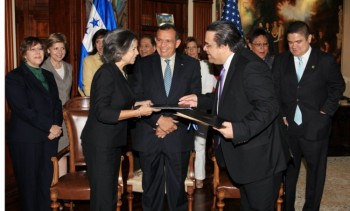The government of Honduras, led by President Porfirio Lobo Sosa, signed a Security Memorandum of Understanding with the U.S.A. on Thursday, September 13th.
The instrument was signed after meetings of the first U.S.- Honduras Bilateral Human Rights Working Group. The Working Group sessions focused on advancing bilateral cooperation in combating impunity, reforming Honduras’s justice sector, and strengthening Honduran human rights institutions.
Senior Honduran officials, representatives of non-governmental organizations, human rights activists, and youth leaders met to discuss the importance of human rights, strengthening the rule of law, and improving citizen security.
The Under Secretary for Civilian Security, Democracy, and Human Rights of the United States, Mario Otero, was on her third trip to Honduras, and was joined by US Assistant Secretary for Democracy, Labor and Human Rights, Michael Posner; Deputy Assistant Secretary for Western Hemisphere Affairs, Liliana Ayalde; representatives from the US State Department’s Bureau of International Narcotics and Law Enforcement Affairs (INL), and Bureau of Conflict and Stabilization Operations (CSO).
 The document outlines the urgent need to strengthen bilateral cooperation in designing and adopting practical measures to address threats to public safety in Honduras. It states that the United States of America, through the Central America Regional Security Initiative (CARSI), and relief and development programs related to public safety, is committed to complement efforts of the Government of Honduras to develop the capacity of its institutions of law, law enforcement, and prevention programs, alongside community development.
The document outlines the urgent need to strengthen bilateral cooperation in designing and adopting practical measures to address threats to public safety in Honduras. It states that the United States of America, through the Central America Regional Security Initiative (CARSI), and relief and development programs related to public safety, is committed to complement efforts of the Government of Honduras to develop the capacity of its institutions of law, law enforcement, and prevention programs, alongside community development.
They seek enhanced cooperation, focus and structure in joint efforts towards shared objectives. Achievements represent shared goals, including preventing the entry of illegal drugs into the territory of Honduras, intercepting the drug once within the country, ensuring the effectiveness of justice officials, strengthening the rule of law and other democratic institutions, protecting human rights, eliminating corruption, preventing crime and violence, and assisting communities most adversely affected by crime and violence.
Within 45 days of the signing of the Memorandum of Understanding (MOU), a separate operating plan will be devised, with specific actions defined, deadlines, and staffing and resources that each government can make available to achieve the objectives outlined.
The two Governments identified the following five goals to serve as the basis of their cooperation on public safety:
- Maintain the integrity and sovereignty of Honduras by preventing the illegal entry of unauthorized persons and contraband, and coordinating efforts to intercept contraband that manages to penetrate the borders.
- Increase the capacity of the Honduran judicial officers to investigate, prosecute and sentence criminals. The two Governments would support the following activities in this regard: specialized units of law enforcement, the creation of a Major Crimes Unit capable of providing investigative support nationally for critical cases, the strengthening the Directorate of Anti-Narcotics, coordination with the Public Ministry to increase its ability to investigate and prosecute high-profile cases, and adopt effective legislation to stop the operation of complex criminal organizations.
- Build community and municipal support programs aimed at preventing crime and violence, identifying local solutions to local threats, and providing secure locations for youth education and vocational training, and a reform of the juvenile justice system to provide alternatives to detention for nonviolent juvenile offenders.
- Eliminate corruption and criminality within law enforcement institutions. Establish mechanisms integrating standardized procedures for personnel evaluation, and strengthening staff capacity issues. Establish avenues to investigate and prosecute individuals within institutions of public security, or law enforcement, who are suspected of, or are suppose to have, committed crimes, or are accused of violating the public trust.
- Create a special support group to investigate and prosecute financial crimes, including money laundering, crimes that generate profits that need to be washed, and seizure of assets, including efforts to seize criminal assets and use proceeds from other illicit activities.
The MOU took effect from the date of signature by both Governments, and will last indefinitely, but the Governments will evaluate cooperation under the MOU annually to ensure that they continue to support a joint action strategy for the “safety” of the Government of Honduras.
The Governments may agree to modify or amend the MOU in writing. Any Government may terminate the MOU, but it is suggested they aim to provide a written notice 90 days in advance to the other Government. Unless it is amended to establish the contrary, the MOU will remain in effect until terminated by either Government.
Nothing in the MOU is intended to repeal or amend the laws of the United States of America or the Republic of Honduras. The MOU is not intended to create, confer, grant or authorize rights, privileges, or obligations to any person, public, or private entity, according to national law or international law.
It was signed in Tegucigalpa, Honduras on the thirteenth day of September, two thousand twelve, in English and Spanish, by
Arturo Corrales Álvarez and Maria Otero
You must be logged in to post a comment Login